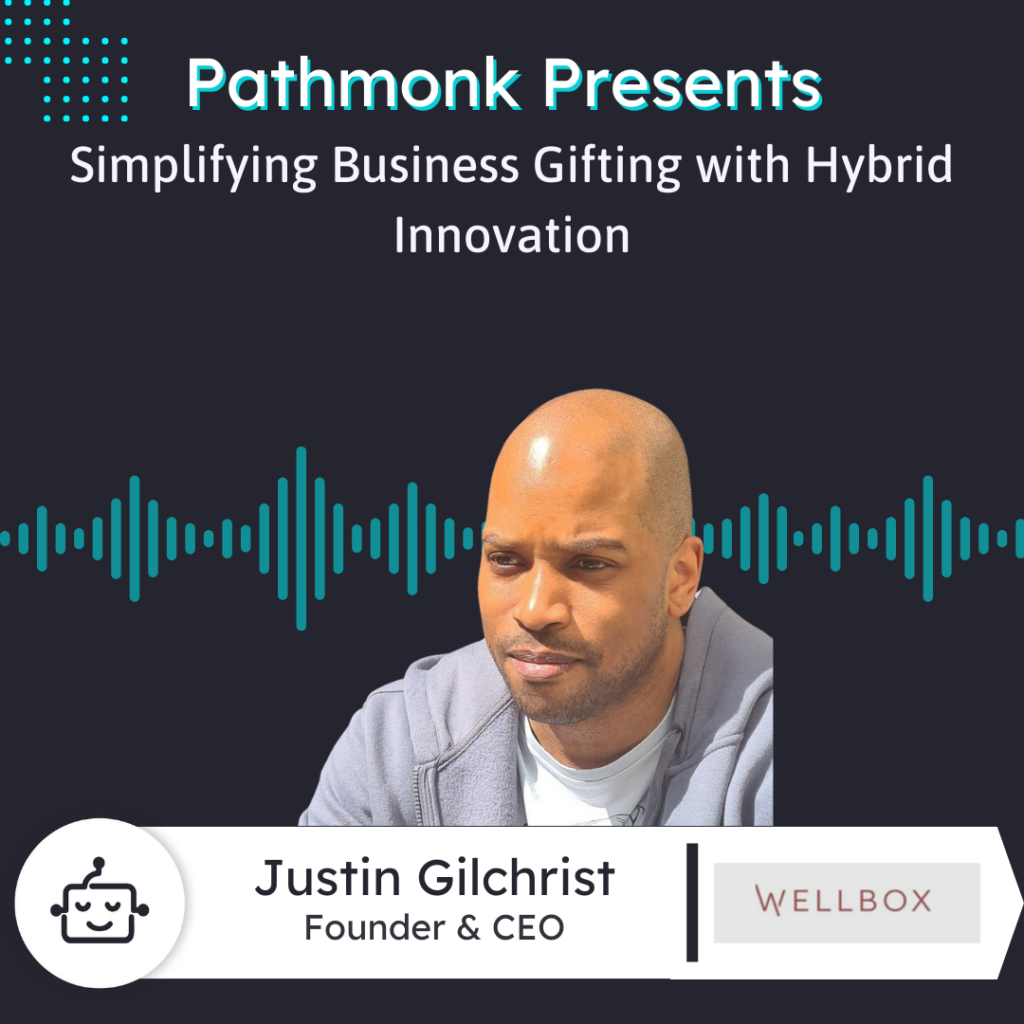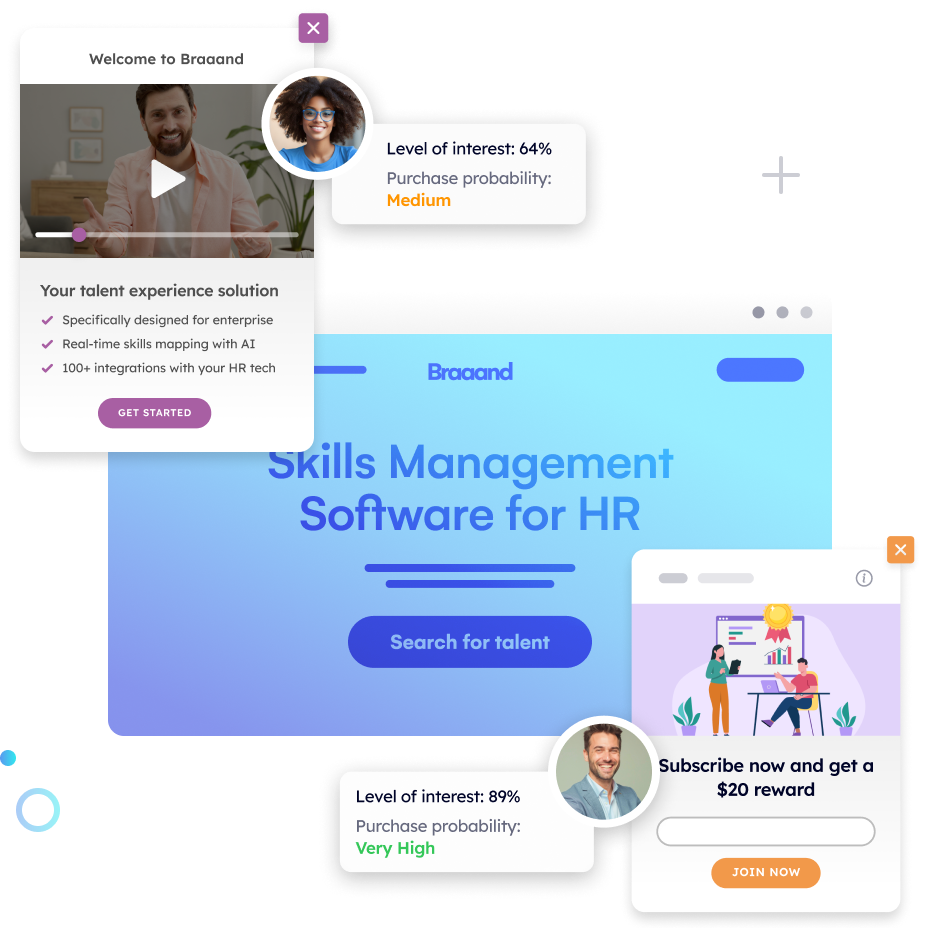
Introduction
Justin Gilchrist, CEO and Co-Founder of WellBox, joins Rick on Pathmonk Presents to reveal how their Manchester-based hybrid SaaS and e-commerce platform streamlines corporate gifting.
Serving 80% of the FTSE 250, WellBox crafts bespoke gifts for employees and clients from three warehouses. Justin discusses their inbound-driven growth, website’s trust-building role, and focus on simplicity for HR and sales leaders.
Learn how WellBox redefines gifting in this creative episode!
Increase +180% conversions from your website with AI
Get more conversions from your existing traffic by delivering personalized experiences in real time.
- Adapt your website to each visitor’s intent automatically
- Increase conversions without redesigns or dev work
- Turn anonymous traffic into revenue at scale

Rick: Pathmonk is the AI for website conversions. With increasing online competition, over 98% of website visitors don’t convert. The ability to successfully show your value proposition and support visitors in the buying journey separates you from the competition online. Pathmonk qualifies and converts leads on your website by figuring out where they are in the buying journey and influencing them in key decision moments with relevant micro experiences like case studies, intro videos, and much more. Stay relevant to your visitors and increase conversions by 50% by adding Pathmonk to your website in seconds, letting the artificial intelligence do all the work while you keep doing marketing as usual. Check us out on Pathmonk.com.
All right, everyone. Welcome to today’s episode of Pathmonk Presents. Today we are joined by Justin Gilchrist. He is the CEO and co-founder of Well Box. Justin, welcome to the show.
Justin: Hey Rick. Thanks for having me on.
Rick: Of course. So Justin, I think this one will get some people excited, especially from the UK, but not only in the UK. And what I mean by that is that your company has a special proposition. So without me getting into it, I would love it if you could just talk a little bit about Well Box, and how would you describe it to someone new?
Justin: Absolutely. So our overall goal is to make gifting as simple as possible for business users. Businesses send gifts for various reasons. Some send gifts to their staff—when a new member of the team starts work or is due to start, for holidays, or anniversaries like one year in service, five years, when someone comes back from maternity leave, or is about to retire. Hopefully, they don’t come back from retirement!
It could also be a gift to a client, a renewal gift, or a gift to help close a prospect. We help make all of these gifting moments easy. We’re quite unique in the fact that we’re a hybrid of SaaS and e-commerce. We operate warehouses—we have three warehouses here, all in Manchester. We produce the gifts, customize them, do all the bespoke printing in-house, and warehouse merchandise for companies to dispatch when needed. But we also provide the software platform that makes all of that easy—and most of all, secure.
Rick: That’s really cool. And we were just talking offline about the fact that you’re based in the UK and serve UK companies, but not only. Is there any specific industry or vertical that you think you’re able to serve best? Or do you think this applies to anyone and everyone?
Justin: Yeah, I mean in terms of playbook, what we do is universal. I’ve had this conversation with other SaaS founders in the UK, especially in Manchester. The further removed you are from the US, the harder it tends to be. You almost become better at what you do by necessity.
Anyone in the UK has probably heard that the UK economy isn’t doing that well compared to others. We’re experiencing slower growth. It’s harder to grow as a SaaS company, and raising money is more difficult than in the US. I don’t think that’s ever been any different.
That said, we’ve got a great finance industry here, especially fintechs, mostly based in London. But we’re in Manchester, which is the third largest city in the UK but widely regarded as the second most important after London. A lot of people from Birmingham might disagree with me!
Still, there’s a good concentration of startups here. But it is harder to build software outside the US, and even outside London, simply because it’s harder to tap into networks, and the local market is smaller than in the US.
Rick: Makes sense. So across your customer base, is there a specific kind of person who usually ends up on wellbox.co.uk and goes for gifting? Is it the office manager? I’m trying to understand who actually buys from you.
Justin: Absolutely. That’s one of the pivotal things—as you grow and develop different ICPs, it’s about having the sophistication to understand and speak to those personas differently.
Our core ICP is someone working in HR, typically relatively senior. In smaller companies, it might not be HR—it could be the CEO or someone with dual responsibilities between HR and office management. But in the companies we target, it’s generally your head of HR, head of people, or chief people officer. In large organizations, you’ll often find someone specializing in staff rewards and benefits.
That’s our sweet spot—we’re heavily into employee and HR gifting. But as we grow, we’re also moving into different segments. We now deal a lot with heads of marketing and heads of sales, as well as facilities and office management, especially for things like regular snack box deliveries as a perk for employees.
So it depends on the business unit, but HR remains our core.
Rick: Makes sense that heads of marketing and sales would be interested—it’s great for higher-touch outreach. Something well-crafted and personal definitely grabs attention.
Justin: Exactly. And if you think about how direct mail has changed—it still works. I’ve been doing this for 25-26 years. I remember being obsessed with direct mail, and the most sophisticated it got back then was taping a pound coin to a letter as a gimmick.
Direct mail now still works—especially for finance companies, cards, etc. They’re constantly sending it out. It’s like pizza flyers: if they send you 20–30 a year, they must be getting an ROI.
What we do is really just an extension of direct mail—sending physical goods. A marketing team with a CRM segment of warm, sales-qualified leads might send a personalized or branded gift—something valuable, aligned with company branding and values. The ROI and conversions are great.
In a digital world, being able to send something physical that people can touch, something unexpected and high quality, creates delight and emotional connection. That’s powerful.
Rick: Yeah, in the ’80s and ’90s, direct mail was everything. Then email came and people thought direct mail was dead. But now, services like yours are bringing it back with that wow factor. Email is intangible—but receiving a surprise gift is a full sensory experience.
Justin: Exactly. And knowing where in the pipeline to use each type of outreach is crucial. For top-of-funnel leads you know very little about, sending a physical gift would be a waste—maybe a letter or postcard is more appropriate.
But for mid-funnel—someone who downloaded a whitepaper or booked a demo but didn’t convert—that’s a good time. A simple box of cookies with a personalized message can brighten their day and create an emotional link.
Further down the funnel, you might send a larger, more expensive gift if someone’s been in your pipeline for months or is celebrating a milestone like a promotion or going on maternity leave. That creates lasting memories and increases your chances of conversion or long-term loyalty.
Rick: Definitely. Let’s say I’m an HR director searching for gifting services and I land on Well Box. What’s the role of your website at that point? Both in terms of attracting and converting?
Justin: Our website is everything. Unlike others in our space, we currently serve over 80% of the FTSE 250. That’s like the UK’s version of the S&P 500.
We don’t do outbound sales. Everything has been inbound—so the website is critical. We use different inbound channels—digital, word of mouth—and the website is where the funnel continues.
Initially, we focused too much on selling. But that approach didn’t work for us. We’ve since shifted. For small one-off purchases, we’re still e-commerce. But for our ideal clients—those using the platform—it’s about building trust.
We try to anticipate what journey a visitor is on and where they are in it. Then we serve the right information at the right time. That’s hard—it’s been a lot of trial and error.
Rick: I like that transition you mentioned. When it comes to high-converting websites, what have you learned from your experience—both at Well Box and previously? What works?
Justin: One of our early mistakes was thinking we needed to behave in a certain way to be “enterprise.” But we realized that what works well in B2C and retail can also work in B2B.
People within organizations are still just people. They want to be entertained, informed, and they want quick access to what they need.
Also: simplicity. In B2C, the buyer is usually the end consumer. In B2B, especially with gifts, the buyer is often removed from the end user. Their goal is to do their job—not to find the best gift in the world. They want to get in and out, quickly and efficiently.
So every time we’ve simplified the site, conversions have improved.
Rick: Simplicity is the keyword. But your explanation makes that word mean something more practical. It really ties into product-market fit, too.
Justin: Absolutely. And you can’t achieve product-market fit until you know who you’re targeting. Early on, we were happy with anyone buying. But at a certain point, you need the courage to focus on a specific segment and use case. Then you can refine your messaging and streamline the experience for that user.
Rick: It sounds like you’re truly connected to your audience. Understanding the buyer, but also considering the end user—the one receiving the gift—and creating a full experience. That’s a great service.
We’re nearing the end, and we always finish with a rapid-fire segment. The only rule: keep it short and crisp. Ready?
Justin: Absolutely.
Rick: Last book you read?
Justin: Who is Michael Burt?
Rick: Anything stick with you?
Justin: Be nice.
Rick: One thing your company is focused on right now?
Justin: E-gift cards—tied to our expansion.
Rick: No boundaries in tech—what’s one thing you want fixed today?
Justin: I’d like to do more with AI—mainly operations. Mass personalization. Letting people really personalize easily.
Rick: One repetitive, annoying task you do every day?
Justin: Making my breakfast. Same one, Monday to Friday.
Rick: Could you automate it?
Justin: I wouldn’t want to—I enjoy the mindfulness. But emails? That’s a big one. I handle all the edge cases. I’d love automation for that.
Rick: One piece of advice you’d give yourself if you were starting over?
Justin: Focus. On the market, the product—just focus.
Rick: That ties nicely to mindfulness. Last one: if someone forgets everything from today, what’s one thing they should remember about Well Box and the work you’re doing?
Justin: There’s always a different way. We’re self-funded, with a happy team, and building a software company differently. The e-commerce side gives us cash flow and an elegant acquisition strategy. Think outside the box—do things your way.
Rick: Love that message. Where should people go if they want to check you out?
Justin: Wellbox.co.uk. I don’t do much digital—I’m mostly offline outside of work. But I do recommend reading more. Biographies, books, and podcasts—there’s so much great information out there.
Rick: Love it. Sometimes we need to unplug and live offline. Justin, thank you for being on the show—I really enjoyed the conversation. Hope we talk again soon.
Justin: Thanks, Rick. Thanks.



